|
Know thy enemy they say, and fear certainly feels like our enemy.....except fear isn't our enemy, that is simply how we have framed it for our entire life. But we certainly do need to know fear intimately if we are to find any freedom from it as the demon we imagine.
We have learned to fear fear itself. Yet like our relationship to almost every objective experience, those where we frame our 'self' in relation to 'another' , the object is always mistaken to be the cause of our experience. We have talked in our sessions about this often. For example chocolate may be imagined to be a source of pleasure but eat enough chocolate and you will feel sick - it becomes the source of your suffering instead. A shiny new car may be the imagined source of joy but tied up in that purchase is a huge amount of anxiety around it being scratched, damaged or stolen. Likewise the perceived source of our fears have no inherent 'fearness' about them. You might be terrified of heights but end up becoming addicted to the joy of skydiving out of planes of base-jumping from tall buildings. - life is an odd thing. It is not the external objective experience and it never has been, whether that be a spider, a fear of leaving the house, a fear of looking foolish or fear of missing out. But the feeling of fear is tangible, very real and is what we actually react to. Our past history, life experiences, culture, family and so on have caused us to perceive certain things as a threat. Whether that threat be a direct threat to our physical life or an indirect one to our imagined sense of self. Lets take a look at a few examples:
Firstly we have to explore this very reaction, not by reading endless books on it - that might expand our knowledge but not our understanding. What is your experience of fear? What does fear feel like? A tightening or a clenching of the body somehow? Shortness of breath, a pounding head? We all have a somatic sensation to the things we are averse to. However our great mistake is to attribute the fear to the external object when in fact we are simply averse to the unpleasant sensation in the body itself. So before anything else we must become familiar, intimately familiar with those sensations, for only when we do this can we start to break the illusion of what we are reacting to. We see the truth of things rather than the illusion. So that will clear up some misunderstandings and with enough observation and presence of mind we may start to break this chain of reactivity; eventually we might even un-condition our conditioned responses. However this takes a great presence of mind, effort and alertness. There is a bigger question though and maybe it guides a different approach. Why does this fearful response arise at all? The short answer is that it arises because we mistakenly imagine ourselves to be separate from the world. The notion that there is 'us' and there is 'other' separate to us - at least to our thinking mind. This brings us to a second and one might say more fundamental way to deal with our fear; that is to abolish the misunderstanding of a separate self. To move away from our obsession with thinking, because it is thinking that imagines a separate self and instead to see that we are always and only ever, pure awareness or consciousness. That is our true self, not this ever changing, transient physical body and mind. Again this is a topic that we have explored in detail, so if you have missed that then please go back and watch some of our past group sessions on the website free resources page. So from this new paradigm, when fear arises, we might first see clearly the experience of fear, but then we are awake to the fact that it is simply an arising experience within our pure awareness. There is absolutely no need to reconfigure it, move away from it or resist it. In fact we actually 'lean into it' fully, being fully present with it as an arising within the field of awareness or consciousness. We see that it in no way affects, colours, stains or alters awareness - how could it - and that in fact it is of no more significance than a passing sound, sight or any other thought. There is no distinguishing property of fear that makes it any more important than these other experiences. Its #danuary a month of allowing and noticing spontaneity, naturalness.
But what is it to be spontaneous? Is it even truly possible, if we think of doing something does that not remove the spontaneity from it? Of course, we imagine that there has to be some pre-meditation upon every action, even if it is only for a brief moment beforehand. Yet so much of our life revolves around spontaneous decisions, gut feelings, going with the flow. We might not recognise those moments as true spontaneity but thats what they are. Moments that arise from outside of the thinking mind. Yesterday in the middle of another project I went to the man cave to fetch some different sized screws; whilst searching for the box I needed, I uncovered a metal drum that I had been making before we moved house and that I hadn't finished. Before 'I' knew what was happening I had the drum on the workbench and was fully engrossed in tuning the notes – something that I hadn't finished. There was no thought of guilt, that I should be completing the task that I was already on. Why should there be? Why should the joyful spontaneous unfolding of our day be wrapped in guilt and regrets of should be and could be. Isn't 'I am being. There is doing' more than enough? I went surfing a couple of days ago, except that 'i didn't tactually go surfing because I decided not to go in once i got there. On the drive back up the hill from the beach I was blown away by the scene in the photo below, we stopped in the middle of the road for ten minutes and looked, took countless photos on the camera and phone. A spontaneous moment of unimagined joy. That might not even be something that we particularly 'want' to do, there are moments of spontaneity to be found in our paid work or employment. Every moment of every day has an opportunity to be spontaneous if we step out of over thinking and projecting our actions into an imaginary future. n Taoism Ziran is the manifestation of spontaneity, but it is interesting that it is not only translated as spontaneity but also as 'naturalness', 'so of itself' 'so of its own'. My interpretation of this is that it much more of an allowing to happen as opposed to our usual way of forcing to happen or making happen. Simply to let life unfold in its naturalness, to be intrigued and fascinated by the unfolding, by the play or 'lila' of the universe. To wake up and wonder what the day holds, even in the worst of tasks, most testing of jobs, to wonder what glimmers of light might appear, what wonders might unfold. Allowing the mystery of our existence to be a source of constant joy. I'm certainly not 'there' yet, but when I remember this it always lifts me up and reminds me that even though I'm wet through in the pouring rain (my worst situation!) its also kind of magical and Im very conscious of how alive I am and what a gift life is. I remind myself - don't waste it by dwelling on the humdrum and the negativity So #danuary is a call to ziran, to spontaneity. Id love to see the opportunities to notice that naturalness you find in every day, however small and simple they might be. Why do bad things happen to good people? and Why the year hasn't really been weird at all.12/23/2020
I was in the car yesterday and I caught an item half way through. They were discussing various topics with an author who also seemed to be something of a philosopher. As I missed the start I'm not actually sure who he was but I was intrigued when the question arose 'Why do bad things happen to good people?' and he set forth with an in depth analysis of the psychological reasons of how we establish this as individuals and how we can alter that statement so that better things will arise for us (or at least thats how I interpreted it – I may be totally out of alignment with what he meant! This has always been one of my favourite topics as it establishes in one sentence the very mistaken way in which we view our entire existence and our grasp of reality. Most simply put there are two glaring mistakes in this statement - the first is that we assume we know what constitutes a 'good person' and the second is that we believe we know what 'bad things' are. There are essentially no 'bad things', there are just things and there are no 'good people' there are just people. Things and people arising and 'happening', as is the inevitable movement of the universe, the constant shift of energy from one form to another. Simple physics. Things, energy can't be created or destroyed, only transferred from one form to another. Yet because we put everything into the context of a world that is somehow aligned around us, every thing seems to have a polarity – good, bad or neutral. That polarity is based very simply upon whether we perceive the thing happening to be in line with what we think is our direction in life, or at least what we imagine that direction should be. For most of us, certainly in the West, that direction is imagined to be 'a pain free, healthy, comfortable. long life – ideally free from death and the thought of it if possible'. Therefore everything arising around us gets this label of good or bad. We chase the things we imagine are good and we run from the things that we imagine are bad. We are equally indifferent about the neutral, but even in that, the ignorance is essentially the same because it is still all placed in context to us. Likewise every person has no inherent good or bad, however much we might argue so. If that was the case, ever person would be hated or loved equally. But what about say, Hitler and the Dalai Lama – surely everyone agrees that Hitler was bad and the Dalai Lama is good? Well there are plenty of politicians and even a great number of Buddhists who very much dislike the Dalai Lama, if you don't believe me then dig into it on the web. Hitler was no doubt responsible for terrible atrocities, but you could also say that he was loved by many, however deluded we imagine that to be. You could also say that from that awful period of war came 75 years of so far of relative peace in Europe – a continent of so many cultures, languages and religions. Of course it also led to greater confrontation in places such as the Middle East after they were carved up. Nothing is ever cut and dry simple. So another 365 days have passed since this time in 2019. In those 365 days the sun has risen every morning and set each evening, totally unaffected by the trivial concerns of man. Many will consider it to have been the most awful year ever, there seem to be many also who enjoyed the lockdown periods, the moment to finally disengage with the rush and stress that is the hamster wheel of modern living. Lives have been sadly lost due not only to the virus but to other knock on effects, but many lives are always lost, that is the natural way of life. We would all be doomed as a species if no-one ever died. A few hundred years ago I would be in old age right now – in fact with my asthma it is doubtful that I would have even lived this long. And no doubt many lives have also been saved as a result of less traffic accidents, less pollution, other infectious diseases that haven't been transmitted due to physical distancing measures. There have certainly been way more babies conceived and born this year than I can ever remember from the friends I know! Nothing is cut and dry, black and white. The only thing that has really changed is our view of 'reality'. That is where most people have really suffered. No-one knows what each day will bring, as a species we resist change because our survival is based on an environment that we understand the rules of. But when those rules are constantly shifted and the boundaries of the environment are altered, we suffer stress. Yet in our world, those rules are simply conditioning. Rules, governments, they only have the power that we accord them. If enough people disagree with something then laws, rules, governments change. They were never solid we just imagined that they were. A deception of our own making. The world, the energy changing shifting form one form to another, that hasn't altered at all. That is inevitably consistent and always will be. However much we resist it and cause ourselves suffering as a side effect of that resistance. So thats an awful big ramble, was there any point to it? I'm not sure it matters. How you take it will again be polarised depending on how you perceive it to relate to you and your imagined path through life. It isn't for me to convince you that any of it is 'right or wrong', in all honesty I don't care less. Maybe if we observe how things affect us and how we polarise good and bad things, good and bad people, that will be a start. Perhaps we will suffer a little less if we resist and chase and little less. Perhaps if we simply allow things to unfold, with a fascination and curiosity rather than a classification, perhaps then life takes on this attitude of the great game talked about in almost every religion if you dig deep enough. Hoping that you all have a fascinating and unforgettable Christmas, whatever incarnation that might take. Photo by Jongsun Lee on Unsplash To be human is to suffer said the Buddha. It sounds a bit depressing but it wasn't meant to be so, there is far more content in that statement than I could ever talk about in a short blog, or fully understand, but let's get down to the basic idea of it anyway and see what you take away for yourself.
I was lying awake in bed last night, I woke up around 1am because, being a middle aged man I needed the loo. Often I can get back to sleep quite quickly, but at the moment we seem to have a lot of things going on in our life and of course once back under the duvet I accidentally allowed my attention to slip to one of these and that was the last I saw of sleep for at least another hour or two. That might sound strange coming from someone that likes to share meditation teachings and all of that sort of thing but at the end of the day it is also what makes me human. I haven't passed beyond suffering, I believe that I am still human and in fact there is no suffering other than that which I create for myself as this human. Let me try to explain it another way. There is a situation in my daily life that needs to be resolved right now. Don't worry its nothing that exciting but it does niggle me most days at the moment and causes me some anxiety. The thing in itself is largely out of my control and in and of itself it carries no suffering, it is just a situation that has arisen. A situation isn't suffering, it doesn't contain suffering, any more than a car alarm is suffering – its just a car alarm. If I don't like car alarms I'd suffer to hear one, however if I had been deaf for my whole life and then I suddenly heard a car alar, it would be the most amazing sound ever! You get my point? The car alarm has no inherent suffering attached to it, nor does anything, however much we might believe they do - that is just our greatest misunderstanding, what in yoga we would call Avidya. So where on Earth does this suffering arise from if it doesn't come from things outside of me? Its not like I would actually create suffering for myself is it? That would be an insane thing to do.....? When my attention first went to the situation that I am currently feeling anxious about there was a moment of decision right there. I had a chance to choose to give it my attention or not. The problem with a lot of this is that we simply forget. In fact I really think that meditation should be renamed 'Remembering practise' because that is actually all we have to do. We constantly have to remember that we have a choice and that choice is where the attention or awareness rests So why do we choose to put that awareness on our disturbing thoughts for so much of our time? Simply because the awareness finds them so fascinating. They are an unsolvable problem to chew over, watching the breath is nowhere near as fascinating, at least not at the start of our journey. You might say that herein lies some of the truth of what the Buddha was exploring - to be human is to suffer. The question that we might sensibly ask here then is what does it mean to 'be human' – what does that entail? Because by extrapolation from the Buddhas observation, we might conclude that to not be human is to not suffer? My awareness could be said to be what I truly am; we have explored this in past blogs – explored why we aren't our body and we aren't our thoughts because both of these are constantly shifting and changing. The only thing that is unchanging is my awareness (not be confused with my senses – I can be aware of my senses – but the awareness knows the senses, it isn't the senses themselves.) The 'humanness' that my mind (thoughts) imagines myself to be isn't the awareness; the humanness I imagine myself to be is the body, the thoughts, emotions & so on – the faculties of being a humans you might say. It is only these bodies, thoughts and emotions that appear to have any problems at all. The awareness has no problems and never has had, how can it? It is simply aware. Sooooo, if we confuse ourselves to be human then of course we confuse ourselves to have all of these problems associated with that humanness and therefore we imagine that we suffer. Logically then 'to be human is to suffer'. If 'I' could permanently remember that 'I' was not this human form, no suffering would exist. Sure things would happen (from your human point of view you might classify some of them as bad or negative) but essentially they are just things happening, not good or bad. Empty of any inherent suffering, but actually full of infinite potential. That is pretty far out and you might need to read that back half a dozen times to make any sense of it at all. But of course that is entirely natural. After all if all that you had heard for your entire life was very loud white noise, you would assume that the only sound that existed was very loud white noise. Likewise with these ideas, it is very hard to think yourself out of thinking after all 'How do you solve a problem like Maria?' Well Maria certainly can't fix that problem, she is the problem. Eventually when I'm lying in bed on nights like last night, I do remember that I am my awareness, and when I remember that first step, then I remember that awareness is free and I can then let it rest on the breath, the body and indeed even on the thoughts in moderation. I can be aware of the thoughts, I just have to remember not to confuse myself with being the thoughts. It can need to be a forceful process at first, after all as I said, the thoughts are so fascinating, so full of detail, so changing and shifting. But if I direct that awareness forcefully onto the breath for example, after a while I can relax it and allow it to dissolve over everything, the next thing I realise it is morning. Not to worry though, because I'm still very much identified with this human form, however much I logically understand it to be an illusion, I know that I'll get to practice the same thing over and over again tonight as well! If you enjoy working on all of this or are right at the start of your meditation journey you will probably enjoy our Beyond Mind Online Course, which we have reduced by 30% for the Christmas period at a time when many of us are suffering greatly from an over active mind or know someone that is! Now only £25 for 3 hours of video lessons and 3 hours of recorded audio meditations :) After around 4 years of searching for the perfect spot we have finally found exactly what we were looking for! There is a lot to be said for patience! Although we spent the best part of three years searching around North Devon, circumstances and a natural pull drew us further West into Cornwall where we already had the support base of may of our past trainees and tutors locally.
And so we stumbled upon Little Acorn, nestled in an acre of protected Oak woodland, a very rare thing in North Cornwall and hidden down a mile long unmade lane, the only thing that you can hear when you wake up are the birds singing and the stream at the bottom of the hill. Of course that is just the start, we have some adaptations to make so that we can be ready for our first yoga teacher training in April 2021 but nothing that we cant handle! Watch this space for further info, Super Earlybird places are already sold out but there are still a few earlybird slots left. #yogalikewater #bewater #yogateachertrainingcornwall What to do after you have heard your inner voice.....
The term 'inner voice' is banded about a lot in the world of therapy, yoga and all sorts of 'alternative' practices - by which i mean practices that encourage us to step out of the waking dream of our daily lives. What is our inner voice though? It is the truth that you absolutely know to be true, we all have an inner voice talking to us, guiding us in the wisest way to lead our lives. Most of us don't even get to the point of ignoring it though, we are so busy believing what society tells us is correct and then acting in the way that we think we should or behaving as we think we should. that we have drowned out the inner voice entirely and it is no more than a faint whisper. So first of all, it can take a very long time for us to actually hear our inner voice again. where is it located? Certainly not in one physical spot, although our physical body may hold reflections of our inner emotional state for sure. But it can seem like our body is telling us what to do, the inner voice is also called listening to your gut and of course the gut is sometimes called the second brain of the body, but I don't think we should get carried away with pinning it to one particular location - it is much more subtle than that. To hear the inner voice we need to be still, not physically, although that might well help, but a much deeper entire stillness. A stillness of the whole being. We all avoid this stillness, this 'doing nothing' because it is contrary to everything we believe about the world - that we should always be busy, we should be striving towards something, an imaginary destination - yet we find that destination is always shifting, ever eluding us, we chase ever more, less and less still in our frustration to find that stillness though action....its a very bizarre situation! To listen to you inner voice is the most natural thing in the world and when we learn stillness, through meditation or any other practice we will start to hear it more clearly. The more that we listen out for it, the easier it will be to hear. After all, if you dont listen to someone speaking, eventually theylly stoop bothering - so it can take time for your inner voice to begin a dialogue with you again. But the title of this piece is 'Not just About Listening to Your Inner Voice' and that is because it isn't that simple. With dedication we can all hear our inner voice, but to trust it and to follow its advice, against the constant anxiety and fear projected by out thinking mind is another matter altogether. You have to trust that voice, however scary it is to do so. If yo hear the real inner voice, you will know its the truth, there will be no question, but still you have to take the next step to implement that advice. I have had several conversations around this topic during the past month, with different people in different situations. In fact they have all pretty much told me they feel strongly that they should be doing such and such, but find themselves not following that feeling. The result is confusion and a sense of life becoming a struggle. There is resistance to the inner voice, and because the inner voice is the natural flow of life, it feels very much like trying to swim against the current when you ignore it. You will want me now to give you a mass of advice or some tools on how to trust that inner voice, but Im afraid that there aren't any. You either trust it or you don't. you dive into the flow of life and see where it sweeps you, or you stay safely in your known boundaries and wonder 'what if...' I haven't written a newsletter for over a month. Ive barely posted anything on social media, I stopped hosting my evening chats during lockdown. There was no specific reason for these, I hadn't thought about them long and hard, I just intuitively felt that I didn't want to do them. I even tried to write a different essay for this very newsletter several times over the past month or so, but each time I got half way and deleted it, the topic just didn't feel right. It felt clunky and like I was forcing it because I thought that I should write a newsletter. So maybe the key is to stop doing the things that you think you should and just follow the that that you feel instead, After all, our thoughts and the mind constructed from them are not who who really are, they are just what we just imagine ourselves to be. . Copied from my article for the Soul circus Journal here
Yoga Like Water so much more than yoga, I’ll say that for starters - or maybe less than yoga, it depends how you look at it I suppose. That isn’t entirely an accident, it is by some sort of organic design. Right from the start we knew that we wanted to embrace as many like minded individuals as possible, and an awful lot of those don’t practice ‘yoga’ in the generally accepted - touch your toes and hum ‘OM’ - sense of the word. Their yoga might be parkour, free diving, contemporary dance, surfing, making music or art - you name it, if they are obviously in the flow of life then that’s all we need to know. They are basically doing the same thing as us. I think it is this openness to absolutely anyone that has allowed us to meet so many incredible humans over the years. Embracing all of these diverse sets of opinions, methods, styles and so on has been a lesson to others who might be more close minded, that essentially we are all the same. We are all on the same journey but by different routes. Absolutely everyone has something of value to share, they might just not realise it yet - that’s one of the core principles of Yoga Like Water. I would say, our 200 hour ‘Teacher Training’ is the backbone of our community, because over the years it has bought the most people into the Yoga Like Water circle. In reality we call it "an immersion" because it certainly never feels like we are training anybody. We learn as much from the students as they do from us, and that isn’t a cheap throwaway soundbite. We always say that the teachers in training crew guide the feel and energy of every training and that is totally true. We have never had two, year long adventures that have felt even remotely the same. It could be said that all of our immersions, the 200 hours and the ‘further’ explorations, are community run. Even the content is constantly changing and evolving. We now have past students sharing their in depth and niche knowledge with new intakes. For example, we've had physiotherapists working with the human animal model share their experiences with real, damaged human bodies, mime artists share incredible ways in which to hold space and project yourself as a teacher, free-dive record holders sharing their wisdom about the breath, Chinese martial arts wizards opening our eyes to different ways of appreciating energy flow, posture and movement. All of these community contributions make the Yoga Like Water circle unique and ever changing. This desire to keep changing comes from a grounding that everyone questions everything - including us. We don’t set up shop and suggest in any way that what we are sharing is ‘right’, or the ‘best’ way - it is just an opinion and a perspective on things, no more or less valid than anyone else’s. That develops a strong sense of equality, that anyone in that teacher training room might say something that blows us all away. I don’t think we ever set out to intentionally create or nurture any sort of ‘Yoga Like Water’ community; anyone who knows us well would laugh hysterically at that idea! We never even intended to start the first teacher training, but that’s another story altogether. Gemma and I are way too disorganised, random and spontaneous to look ahead at ‘developing’ something over time. We are also inherently quiet people - quite happy with our own company, bimbling along. We are, however, open to just allowing things to unfold naturally. This is why we love how serendipity has seen this extended family grow around us entirely naturally. From a business point of view we are pretty hopeless and happily so. We've never had a business plan, meaning we are never planning to upsell future projects or alternative agendas. We have had several opportunities to expand the Yoga Like Water ‘thing’ vastly over the years, but have never had any interest to do so. It just didn't sit right with us, perhaps because we feel like it would pollute any true sense of community right from the core. I suppose we have a loose idea for the future and have had for some time, in which we find a space that is there to be used by any of the crew - past or future. A place where we can all be outdoors, ideally near to the sea and just do our thing in peace. Not a commune or a community (hippies that we are, we both love our quiet family life too much for that) but certainly enough space that we could hold camping weekends for free for the extended Yoga Like Water family. To offer a tranquil get away when anyone in the crew needs it or finds themselves homeless. Even now we have a constant stream of visiting teachers staying upstairs in the attic through the year of teacher training weekends. It’s lovely to have all this energy in the place and to allow that to ebb and flow as people come and go. If anything, this is a lesson in the most anarchic and spontaneous way of simply watching a ‘community’ to develop - by allowing everyone to be who they are and accepting that as perfect. There are so many diverse characters, from all over the world who, just like us, have their odd ways: the brilliant face of their diamond and the grubby side. But that is what makes them all so memorable. I never complain about what we do, because I genuinely feel very lucky to just be a part of it, I don’t want to run anything, or be in charge of anything. I never have - I’m way too lazy. But to be a part of something that has grown from nothing, however loose that is, is pretty cool. 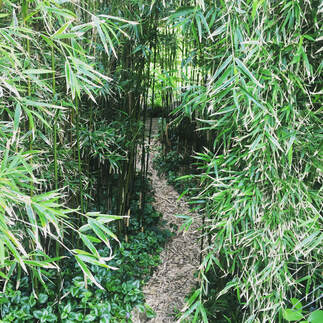 When you get on a train, it would be foolish to keep the weight of your bags on your back or on your head for the journey. Of course we put the bags down and allow the train to do the work, giving us an opportunity to look out of the window and enjoy what passes. Likewise we don't try to push the train in a different direction or to stop it from getting to its destination, that would be a dreadful waste of energy. We can imagine life to be a bit like that train, we are a passenger and are at liberty to enjoy that journey or we are at liberty to carry the baggage of our worries and concerns, then due to those, try to alter the direction of life. That is our free will, we have freedom to try and do those things, we aren't helpless bystanders. But the important question that most of us forget to ask is: why can't we put those bags down in the first place and enjoy the mystery? Why are we always trying to force or resist what is? And how do we know when we are forcing and resisting? Big questions indeed and no ones that are easily answered, if that is even possible! Almost all schools talk about this, whether it is the divine will of God or the perfect flow of the Tao that cannot be stepped out of. That there is a perfect unfolding occurring with every moment of our lives and that for peace to exist within us we have to trust to this flow, to give ourselves to it fully, whether we perceive it to be positive or negative. After all perceptions of good and bad are mental projections, that is to say thoughts, and we know from experience that our thoughts are not not be trusted. They alter at the drop of a hat. Something that I think to be bad right now can turn out to be good later on. We simply have no idea, we don't know. So what about if we embrace the 'not knowing'? Accept 'I just don't know' - what happens then? Well, first of all to accept the flow is a very powerful thing, As we have discussed before, acceptance is not resignation to your 'fate'. Where resignation is disempowering, acceptance is liberating. They seem to be barely different shades, but in truth they are polar opposites. I always have total freedom to act, but the fruits of my action will be determined by whether they are in alliance with the flow of things or in opposition. If they are in accordance then things will happen very smoothly, you may have felt it at times in your life, as if everything in the universe was pushing you along and you were being swept along in a flowing river. At other times things may have felt to be in opposition to the flow, not with the Tao, not according to 'Gods' will. Then life seems sticky, you might get to where you intended by brute force, but it is unlikely that it will work in the long term. So how do we know if we are forcing or accepting? Intuition and practice! Listening to the body, to the signs around you and to how things feel rather than how your mind thinks they should be. Trust your gut and jump int the river. The mystery of where it is going is far more fun than trying to change its course by effort! A fantastic weekend of discussion has just passed on the joint further TT and I am just about to start with a whole new bunch of voyagers on next weeks 200hour Yoga Like Water Immersion. Most people who have taken a journey with me, know that I will happily talk subjects to death in an effort to answer every question that I get asked. I certainly advocate that we should question everything that we take for granted, above all our conditioning and very thoughts.
Over the last year or two I have trimmed my infinity of questions down to a key one or two that I come back to constantly. All other questions seem totally superficial and superfluous once I have checked in with those. I also check in with this tick box when I am asked a question by someone else because it generally guides how I answer most questions too. That question is something like...
As you might be seeing, the conclusion I am coming to is that pretty much every question is flawed at its source because it comes from mind in the first place and every answer I might arrive at comes from exactly the same source. Mind answering mind, or, if I answer your questions, simply my mind answering your mind. Last week I was interviewed by a very lovely lady who was writing her thesis on yoga in the Western world. The key questions were 'Has Yoga been appropriated by the Wast?' and as an extension of this 'Is what you teach really 'yoga' because it seems to draw from so many other disciplines?' After a while pondering over these question it was ultimately clear that again it was the question itself that was flawed. Why? There wasn't an 'answer' that could be given to it, although plenty of other yoga teachers had apparently offered strong opinions. At the end of the day there simply is no 'yoga' to be appropriated because there isn't, never has been and never will be any fixed thing that 'is definitively yoga'. The very question pivots on a phantom, and that phantom is not yoga but the concept of yoga that every individual has. Those concepts of yoga will be infinite because every person will have their own concept of what 'traditional' yoga is, mine is very different to the next persons and so on. There certainly wasn't ever a 'traditional form of yoga in India or anywhere else for that matter. Do you really think that yoga is anything more than a word? That the multitude of millions of ascetics and yogis, over thousands of years, were all practising exactly the same things, some sort of 'definitive' or 'ultimate' version of yoga? Come on, stop kidding yourself that's an insane idea and it simply isn't true. To give any answer would be to fall straight back into the muddy pit of mind and duality that yoga seeks to free us from. I suppose even that assumption is a concept in itself. I have to remember that just because I feel that liberation is the ultimate purpose of yoga, others may differ and rightly so. You see, to try to answer the question is both impossible and ultimately pointless. I really don't care if anyone shares my concept of yoga or not. I don't want to adopt theirs and I don't want them to adopt mine. What benefit would that be to anyone? Of course, if through discussion and sharing ideas without any agenda of who is right and wrong (another imagination) I happen to add to my concept or alter it then thats all well and good. But at the end of the day I must remember that whatever I hold as 'true' is not really true, it is simply how I see things at that moment in imagined space and time, it's all another phantom. The only way to really be free of that is to see it for what it is, that is stepping outside of illusion It is no wonder that circumnavigating solo sailors, at sea for months all alone, often find such clarity in the deep undisturbed quietness that they experience. Yes they may be fighting howling gales and the threat of death at any moment, but the quietness is always there when they start to become totally attuned to their ship and environment. At the moment I am reading The Long Way by Bernard Moitessier. Rarely will you read such simple, insightful words about the true 'self' that he discovers in the days, weeks and months alone, where he loses himself entirely to the ocean and the boat.
I suppose for many of us The Long Way is an appropriate title for our own journey in life; we spend an awful lot of time going nowhere, and like the circumnavigating sailor, returning to exactly where we began. When you spend a lot of time just sitting quietly, walking quietly or doing anything quietly, that is to say, with total awareness, you start to notice a few things that are so obvious you cant understand how you ever missed them before. Like the solo circumnavigator, you start to 'lose yourself' entirely. What does this losing oneself mean? We throw the phrase around, and we get a sense o what we mean but it is very hard to define. I would say that it is when the illusion of the 'self' that you imagine yourself to be, falls away to leave the only real thing that you actually are, that thing that we are all so desperately searching for; the search that caused us to take up yoga or tai chi, to travel the world, to sit and meditate, to visit ashrams or buy statues of buddha. The search. Most of us imagine that the end of this search lies in dedicated and continued practice, such as prolonged meditation or yoga. Indeed we may have brief glimpses of 'clarity', although we cant define what that was we are sure that it has something to do with the thing we are hunting so desperately. If we are not careful this can spiral into an entirely new search to regain that magical sensation, a new distraction. Ee imagine that maybe if we accumulate enough meditation or yoga the clarity will stay, and yet the idea of practising meditation or yoga is a fallacy itself, another trap, it suggests an action or a thing that 'we' must try to do and instantly we fall straight back into the trap of the illusory self trying to solve the problem of the illusory self. Its like a shadow chasing itself to find its true source – it isn't possible. But simply sit quietly, with no effort to do anything, no attempt to still the mind or restrict the thoughts, simply let go of everything, completely, even 'yourself'. Just be there with the thoughts with the pains in the body, with the boredom, the constant calls to urgently do something, anything else and ask which of these passing things is 'me'? Which if them is the 'I' that I believe I am? Let go for long enough and you will realise that you can't find an objective source to pin this sense of 'I' upon. It transpires that 'I' is there when the thoughts come and still there when the thoughts pass away into moments of mental emptiness. The I endures when your left knee is in agony and equally when you forget all about the pain and your knee ceases to exist in awareness. I is aware of the bird singing outside, the breath slipping in and out and the silence when all sounds evaporate. As all of these things come and go, thoughts, pains, sounds and everything else within your consciousness, the only constant through all of them is that they are known. 'I' does not think, there is simply an equal knowing of thought and knowing the absence of thought. 'I' is not in pain, it knows pain and it knows it's absence. I knows sound and I knows silence equally. I is absolutely everything, the apparent 'existence' of everything and the apparent 'absence' of everything. It doesn't need thought or no though; sound or silence; body or no body. It is always, entirely, completely, whatever is. How more simple could it be? The thing you were looking for, the 'you' that seemed to be missing, was already there, all of the time, it simply can't not be there. We will be spending three days just letting go on 'Beyond Mind' in May. |
AuthorDan Peppiatt. Archives
June 2024
Categories |
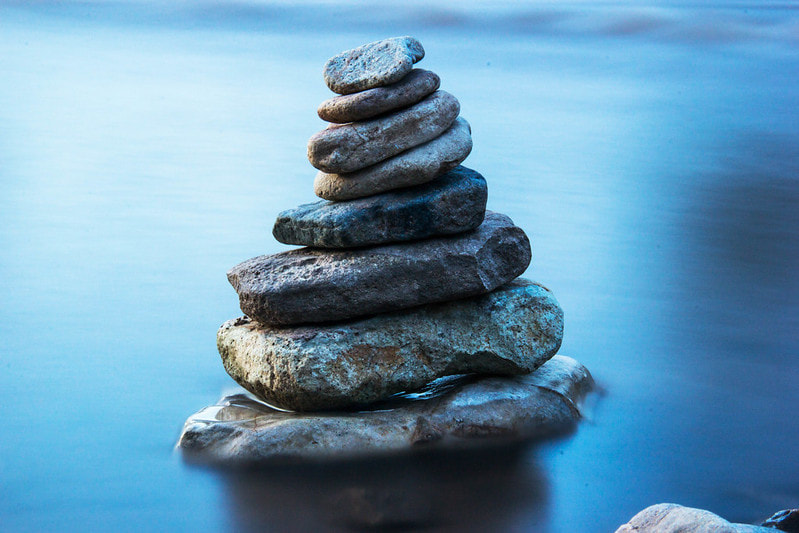
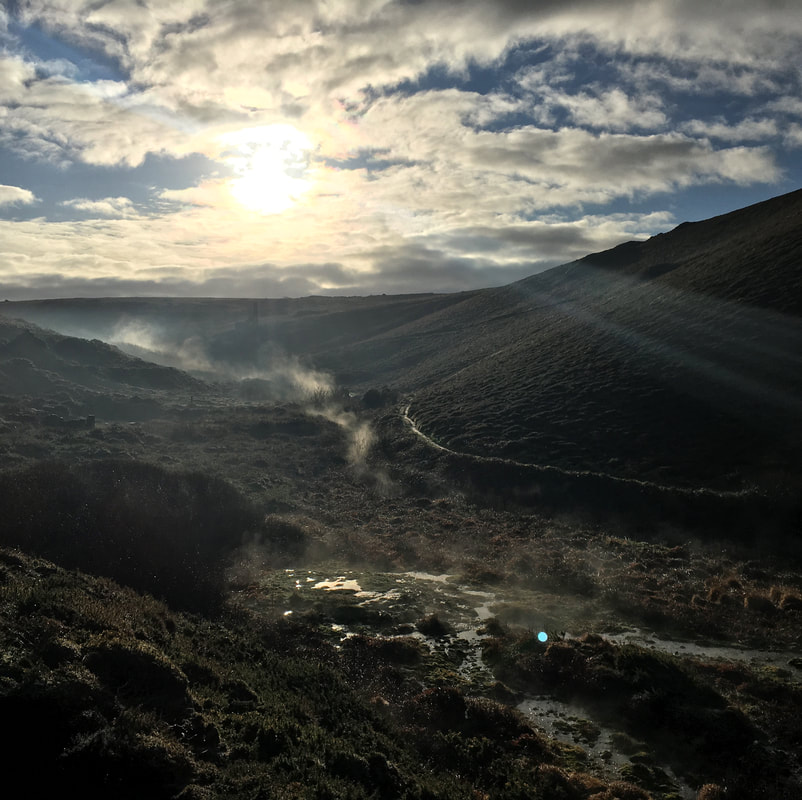


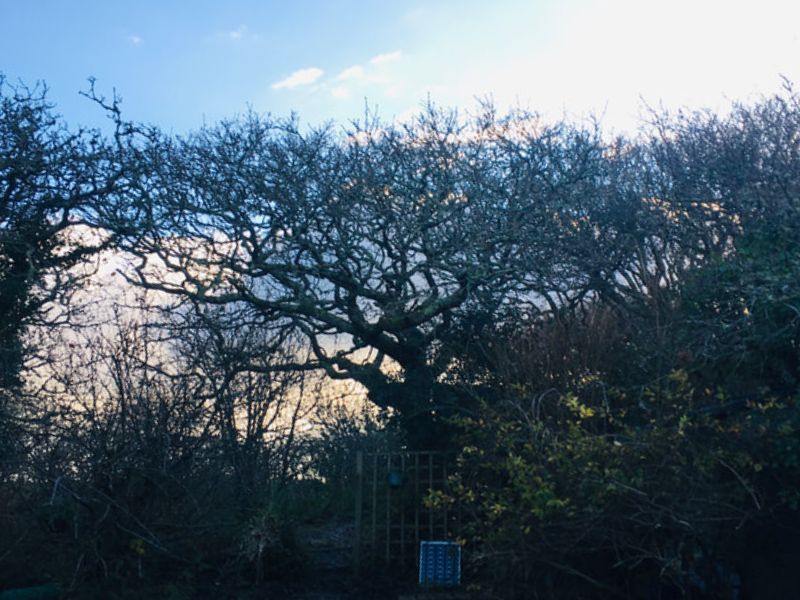
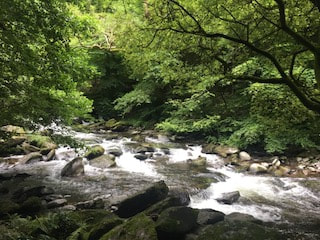
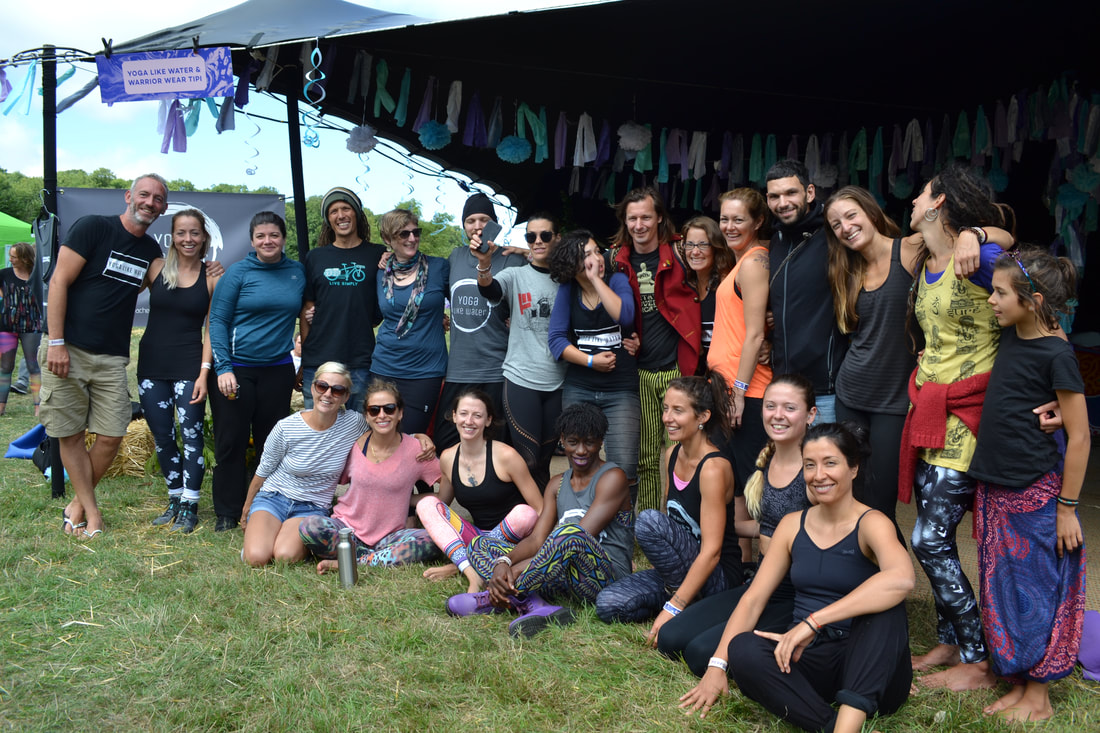
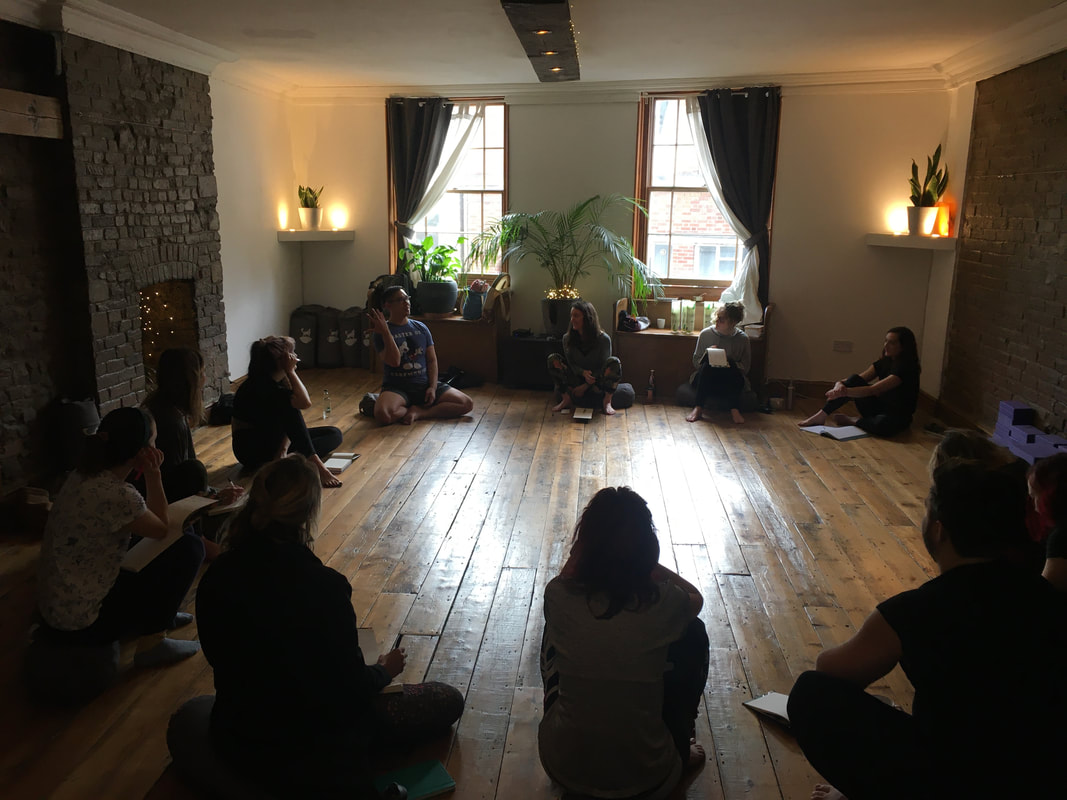

 RSS Feed
RSS Feed